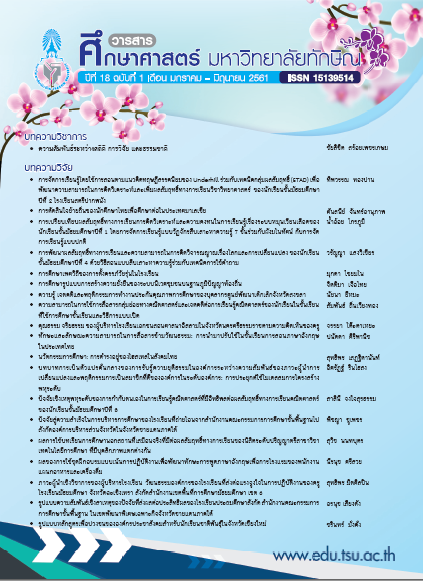ปัจจัยเชิงเหตุพหุระดับของการกำกับตนเองในการเรียนรู้คณิตศาสตร์ที่มีอิทธิพลต่อผลสัมฤทธิ์ทางการเรียนคณิตศาสตร์ของนักเรียนชั้นมัธยมศึกษาปีที่ 3
Main Article Content
บทคัดย่อ
การวิจัยนี้ มีความมุ่งหมายเพื่อ 1) ศึกษาอิทธิพลของปัจจัยเชิงเหตุพหุระดับของการกำกับตนเองในการ
เรียนรู้คณิตศาสตร์ของนักเรียนชั้นมัธยมศึกษาปีที่ 3 ที่ส่งผลต่อผลสัมฤทธิ์ทางการเรียนคณิตศาสตร์ และ 2) เพื่อศึกษาอิทธิพลของปัจจัยเชิงเหตุของการกำกับตนเองในการเรียนรู้การสอนคณิตศาสตร์ของครูผู้สอนที่ส่งผลต่อผลสัมฤทธิ์ทางการเรียนคณิตศาสตร์ของนักเรียน กลุ่มตัวอย่าง คือ นักเรียนชั้นมัธยมศึกษาปีที่ 3 จำนวน 468 คน และครูผู้สอนคณิตศาสตร์ จำนวน 100 คน ที่ได้มาจากการสุ่มแบบหลายขั้นตอน เก็บข้อมูลโดยใช้แบบสอบถาม จำนวน 13 แบบวัด ผลการวิจัยพบว่า โมเดลเชิงสาเหตุการกำกับตนเองในการเรียนรู้คณิตศาสตร์ที่มีอิทธิพลต่อผลสัมฤทธิ์ทางการเรียนคณิตศาสตร์ของนักเรียนชั้นมัธยมศึกษาปีที่ 3 มีความกลมกลืนกับข้อมูลเชิงประจักษ์หลังจากการปรับโมเดล (= 188.528, df = 111, CFI = 0.974, TLI = 0.960, RMSEA = 0.039) ผลการวิเคราะห์ระดับนักเรียนพบว่า การรับรู้ความสามารถตนทางการเรียน แรงบันดาลใจในการเรียน และการตั้งเป้าหมายทางการเรียนมีอิทธิพลต่อการกำกับตนเองในการเรียนรู้คณิตศาสตร์และผลสัมฤทธิ์ทางการเรียนคณิตศาสตร์ ผลการวิเคราะห์ระดับครูพบว่า การรับรู้ความสามารถตนทางการสอน และแรงบันดาลใจในการสอน มีอิทธิพลต่อการกำกับตนเองในการเรียนรู้การสอนคณิตศาสตร์และพฤติกรรมการสอนคณิตศาสตร์
Article Details
ในกรณีที่กองบรรณาธิการ หรือผู้เชี่ยวชาญ ซึ่งได้รับเชิญให้เป็นผู้ตรวจบทความวิจัย หรือ บทความทางวิชาการมีความเห็นว่าควรแก้ไขความบกพร่อง ทางกองบรรณาธิการจะส่งต้นฉบับให้ ผู้เขียนพิจารณาจัดการแก้ไขให้เหมาะสมก่อนที่จะลงพิมพ์ ทั้งนี้ กองบรรณาธิการจะยึดถือความคิด เห็นของผู้เชี่ยวชาญเป็นเกณฑ์
เอกสารอ้างอิง
ผ่องศรี น้อยปรีชา. (2545). การวิเคราะห์ประสิทธิภาพโมเดลลิสเรลตัวแปรที่สัมพันธ์กับการเปลี่ยนแปลงระยะยาวของผลสัมฤทธิ์ทางการเรียนคณิตศาสตร์. วิทยานิพนธ์ กศ.ม. (เทคโนโลยีวิจัยการศึกษา). ชลบุรี: บัณฑิตวิทยาลัย มหาวิทยาลัยบูรพา.
ภัทราภรณ์ สังข์ทอง. (2550). พัฒนาการของการเรียนรู้โดยการกำกับตนเองของนักเรียนช่วงชั้นที่ 2 ที่มีการรับรู้ความสามารถของตนเองต่างกัน สังกัดสำนักงานเขตพื้นที่การศึกษานนทบุรี เขต 1. วิทยานิพนธ์ กศ.ม. (การวิจัยและสถิติทางการศึกษา). กรุงเทพฯ : บัณฑิตวิทยาลัย มหาวิทยาลัยศรีนครินทรวิโรฒ.
อุรัจฉทาธ์ นามรักษ์. (2555). ปัจจัยบางประการที่ส่งผลต่อการกำกับตนเองในการเรียนของนักเรียนชั้นมัธยมศึกษาปีที่ 4 สังกัดสำนักงานเขตพื้นที่การศึกษามัธยมศึกษา เขต 28. ปริญญานิพนธ์ กศ.ม. (การวิจัยและสถิติทางการศึกษา). กรุงเทพฯ: บัณฑิตวิทยาลัย มหาวิทยาลัยศรีนครินทรวิโรฒ.
เอส. เอส. อนาคามี. (2555). พลังสร้างสรรค์ จากแรงบันดาลใจ. กรุงเทพฯ: สำนักพิมพ์สยามมิส พับลิซซิ่ง เฮ้าส์.
Bandura, A. (1986). Social foundations of thought and action : A social cognitive Theory. New Jercy: Prentice-Hall.
Jenkins, J. S. (2009). The effects if explicit self-regulated learning strategy instruction on mathematics achievement. Dissertation, Ph.d. (Curriculum and Instruction). America: Graduated school of University of North Carolina.
Locke, E. A.; & Latham, G. P. (1990). A theory of goal setting and task performance. Englewood Cliffs, NJ : Prentice Hall.
Maria, C.; & Maria Luisa Sanz de Acedo, L. (2010). Looking at teacher Identity through self-regulation. Psicothema. 22(2): 293-298.
Milyavskaya; et al. (2011). Inspired to get there: The effects of trait and goal inspiration on goal progress. Personality and Individual Differences. 52: 56–60.
Mousoulides, N.; & Philippou, G. (2005). Students’ Motivational Beliefs, Self-Regulation Strategies and Mathematics Achievement. In Proceedings of the 29th Conference of the International Group for the Psychology of Mathematics Education. Chick, H. L.; & Vincent, J. L. 3: 321-328. Melbourne: PME.
Muthén, Bengt O. (1994). Multilevel Covariance Structure Analysis. Sociological MethodsResearch. 22(3): 376-398.
Nota, L.; Soresi, S; & Zimmerman, B. J. (2004). Self-regulation and academic achievement and resilence: A longitudinal study. International Journal of Educational Research. 41(3): 198-215.
OECD. (2013). PISA 2012 Results: What Students Know and Can Do- Student Performance In Mathematics, Reading and Science (Volume I). PISA, OECD Publishing. Retrieved August 31, 2013, from http://dx.doi.org/10.1787/9789264201118-en
Pintrich, P.R. (1999). The role of motivation in promoting and sustaining self-regulated learning. International Journal of Educational Research. 31: 459-470.
Pintrich, P.R. (1999). (2000). The role of goal orientation in self-regulated learning. In Handbook of self-regulation. Boekaerts I.M.; Pintrich, P.; & Zeidner, M. pp.451-502. San Diego: Academic Press.
Pintrich, P.R.; & De Groot, E.V. (1990). Motivational and self-regulated learning components of classroom academic performance. Journal of Educational Psychology. 82(1): 33-40.
Schunk, D. H. (1991). Self- efficacy and academic motivation. Educational Psychologist. 26: 207-231.
Schunk, D. H. (2001). Self-regulation through Goal Setting. Retrieved August 4, 2013, from http://www.schoolbehavior.com/Files/Schunk.pdf
TIMSS & PIRLS International Study Center. (2012). TIMSS 2011 International Results in Mathematics. USA: TIMSS & PIRLS International Study Center.
Wolters, A. C.; & Pintrich, P. R. (1998). Contextual differences in student motivation and self-regulated learning in mathematics, English, and social studies classrooms. Instructional Science. 26: 27-47.
Yetkin, I.E. (2006). The Role of classroom context in student self-regulated learning: an exploratory case study in a sixth-grade mathematics classroom. Dissertation, Ph.D. (Education). USA.: Graduate School of The Ohio State University.
Zimmerman, B. J. (1995). Self-regulation involves more than meta-cognition : A social cognitive perspective. Educational Psychologist. 29: 217-221.
Zimmerman, B. J.; & Martinez-Pons, M. (1986). Development of a structured interview for assessing student use of sell-regulated learning strategies. American Educational Research Journal. 23: 614-628.
Zimmerman, B. J.; & Martinez-Pons, M. (1990). Student Differences in Self-regulated Learning: Relating Grade, Sex, and Giftedness to Self-Efficacy and Strategy Use. Journal of Educational Psychology. 82(1): 51-59.


